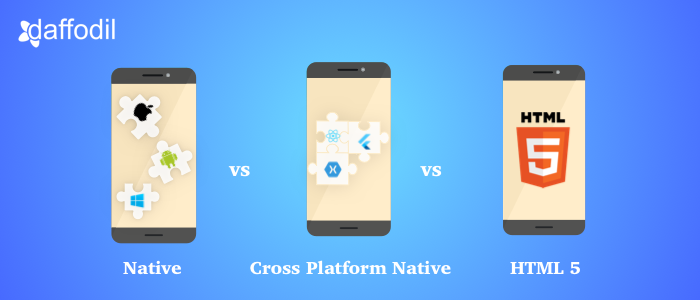
By the end of 2018 Q3, 25 billion have been downloaded from app stores. Considering the popularity and use cases, a mobile app has become an imperative part of a business’s tech-strategy.
To ensure that an app is delivered with expected scalability, cost, and time-to-market, it is important to follow the right app development approach. Native, Cross-Platform Native, or HTML5- which development approach will work best for your app development project. Let’s check out with a comparison between the three.
-
Native Mobile Apps
A native mobile app is developed for a specific platform or device. It has the ability to use device-specific hardware & software and can offer an optimized performance by taking advantage of the latest technologies, such as GPS.
This approach for mobile app development requires versed knowhow of Java/Kotlin for Android app development and Objective-C/Kotlin for iOS app development. Since every component of the app is developed for a particular device, the UX of the app is intuitive and beautiful.
Pros:
-
Native app development is an ideal choice for building scalable apps. Since the app uses the underlying capabilities of a device, the features and functionalities can be broader.
-
Since there is no need to interpret the programming language, native apps are fast and responsive in terms of performance.
-
The UI/UX of native apps matches with the user experiences of the Operating System, thereby offering a better UX
Cons:
-
Native code has to be written for every platform, making app development a costly affair. This also increases an app’s go-to-market for multiple platforms.
-
Cross Platform Native and Hybrid Apps
The billion-dollar app development market has undergone a paradigm shift. If statistics are to be believed, there is a duopoly of iOS and Android Operating System, with 99.6% smartphones running on it. This is where HTML5 and cross-platform native apps come for rescue.
While both the approaches for mobile app development offers the benefit of code reusability, and thus faster go-to-market, they are different from each other in many ways. Here is an introduction to both the approaches and fundamental differences between both of them.
1. Cross Platform Native: These apps are developed using intermediate languages, such as Javascript and have native UX, which is indifferentiable from native mobile apps. High performance, code usability, multi-platform support, native UX, hardware & platform access are some of the positive reasons to go for cross-platform native development, as an alternative to native app development. Some of the popular frameworks that are used for building native-like apps, along with cross-platform benefits include React Native, Flutter, Xamarin, Appcelerator, and Native Script.
ALSO READ: Nativescript vs React Native: Overview and Comparison
Pros:
-
The look & feel of the app is similar to that of a native app. It is hard to differentiate between a native app built using Java, Kotlin, or Swift with that of a cross-platform native app (in terms of UX).
-
Since the apps can access hardware & platform of the device, there is flexibility in features, giving scalability scope.
-
The code is not native of device’s Operating System and thus can be shared for app development on multiple platforms.
-
It is possible to combine a code or components written in an intermediate language (like javascript) with that written in Java, Objective-C, or Swift.
-
The code written for one platform can be shared on another, making this app development approach cost-effective, compared to native apps.
Cons:
-
In some cases, the speed of the app can be impacted due to intermediate languages needed to be interpreted on-the-fly.
-
Customization of the interface is very much dependent on framework or plugin support.
2. HTML5 Apps: These apps use web development technologies- HTML, CSS, and Javascript for building mobile apps. The apps built using HTML5 frameworks are basically the web pages, running in a native shell. Code reusability, easy debugging, simple learning curve are some of the reasons to opt for hybrid app development using HTML5 frameworks.
Some of the popular frameworks that are used for building hybrid apps include Ionic, Framework7, Sencha Touch, Bootstrap etc.
ALSO READ: Why Ionic is the most Favorable Choice for Hybrid App Development?
Pros:
-
The codebase for one platform can be used on another, reducing development cost and time-to-market.
Cons:
-
With HTML5 apps, there are performance and features restrictions as there is no direct access to device hardware & platform.
-
The app UX is not native. For complex and scalable apps, HTML5 frameworks are not an ideal solution.
Which App Development Approach should you Follow?
All three approaches shred above for mobile app development have is own set of cons and pros. Therefore, choosing the most relevant technology for app development depends upon a number of factors, like app features, time-to-market, UI/UX requirement etc.
Need help to choose the right development approach for your app development project? Get in touch with our tech-experts through our 30-minute free consultation program to know more.



